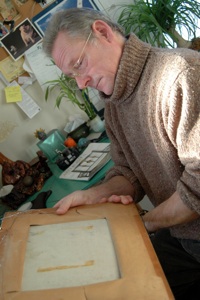Jerry Miller & Company
Appraisals


Jerry Miller & Company
Appraisals

“A good appraisal requires familiarity with the objects, a great deal of research and study, and an understanding of the current market. I am a personal property appraiser accredited by, and a member in good standing of, the Certified Appraisers Guild of America. The Guild requires specific professional and ethical standards of its members. I have been writing appraisals and have been an auctioneer based on Mount Desert Island, doing business as Jerry Miller & Company since 1992. I would like to take this opportunity to offer my appraisal services. Whether it is to settle an estate, to insure property, or to properly value items for re-sale or donation, a well documented appraisal report makes the process easier. My reports are clear, descriptive and precise.
I hope that you will keep me in mind if you should need my services and I would, of course, appreciate it if you would mention me to your friends and neighbors.”
What makes a good Appraiser?
Everything Has Value
Every object has some value to someone. You may already realize that your art collection
or antique furniture is valuable, but other property you own has a less obvious value. This
is especially true if you consider your estate as a whole. Books, jewelry, china, silver, tools, equipment, automobiles, even toys or clothing can add to the value of your estate.
The Role of a Professional Appraiser
At some point in your life you may need to have your personal property assessed for its monetary value. Whether you are considering insurance coverage, tax matters, selling
an object, going through a divorce, or settling an estate for deceased family members,
a professional appraiser can provide you with an unbiased and well researched written evaluation of financial worth. This written appraisal can be used in dealing with attorneys, insurance companies, tax assessors, or even family members if necessary.
Some value, however, may be more sentimental than of any significant monetary value. What may be priceless to or your family is of little to no value to an insurance company or
tax assessor, or would bring little for sale on the open market. It may important to know the difference, and an appraiser can help you make that distinction.
What to Look for When Hiring an Appraiser
You will benefit by hiring an appraiser with the knowledge and experience necessary to provide a complete and well documented appraisal. There are national professional associations that credential individuals based on their tested knowledge and adherence to ethical standards. Two of these organizations are the Certified Appraisers Guild of America and the American Society of Appraisers.
Any professional appraiser should provide you with their resume and references when asked. They should also provide you with an estimate of the cost of conducting the appraisal. That cost should never be a percentage of the value. Such an arrangement could skew the appraisal and would be unethical.
What to Expect from the Appraiser
The appraiser should inspect the property in person and ask you for the history of the property and any existing written documentation available about it. He or she will then do research on the individual items using books, databases, and searching for the most recent sales of comparable items.
The written appraisal should include: the kind of value being determined (e.g. fair market value, replacement value, liquidation value, etc.); the purpose of the appraisal (e.g. for insurance coverage, estate planning, tax purposes, etc.); describe the objects being assessed; describe the procedures used to estimate the value, and finally the assessed value. The appraisal should include the signature of the appraiser and his or her credentials.
A Few Guidelines for Appraising and Disposing
of Personal Property
1. No item is worth the loss of family and friends. Walk away from conflicts over objects.
2. Do not throw anything out while trying to be helpful. Almost everything has value.
3. Many groups accept donations of clothing and furniture. No need to let it go to the dump.
4. Age is subjective. It is not necessarily old because it is in an old house. It may have been there as long as you remember, but not have any real age.
5. Value is subjective as well. Sentimental attachment means nothing to a buyer.
6. Over the long run, small things often add up to greater value than some of the larger items.
7. Look carefully through pockets and on lapels before discarding clothing. The clothing itself may be collectible as well.
8. The item on TV is probably not exactly like yours. This is especially true if some-one saw it just the other day. Television appraisers spend hours researching items before they appear on the set. No one knows everything.
9. Personal family items belong with the family, not on public display.
10. Be patient. Do not let yourself be pressured into snap decisions.
11. Good friends do not necessarily make good appraisers.
12. Hire a professional. An appraiser has the knowledge and ability to objectively evaluate your estate. They should have references and clear proof of their knowledge.